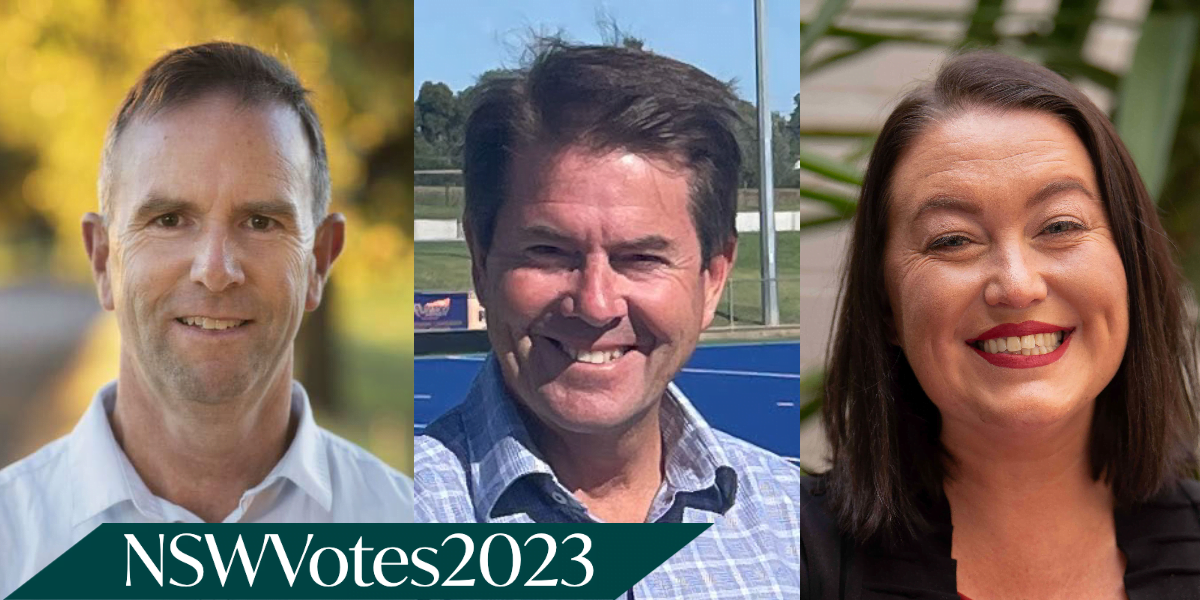Last night’s election debate hosted by the Tamworth Business Chamber was dominated by predictable lines and polite audience applause, with no clear winner.
Sitting member Nationals’ Kevin Anderson, Labor candidate Kate McGrath, independent Mark Rodda, and Greens candidate Ryan Brooke attended the debate. The Shooters, Fishers, and Farmers party candidate did not attend. Candidates were allowed to make opening and closing statements, and asked questions that were collated from around 50 questions submitted prior to the event.
The debate was unusually focused on local government from the first question about financial sustainability. Independent Mark Rodda, currently a member of Tamworth Regional Council, was critical of rate pegging and the special rate variation process and called for state government to stump up more funding. Labor’s Kate McGrath, currently a member of Gunnedah Shire Council, was critical of the Nationals for abandoning their election commitment in 2019 to take back 15,000 kilometres of local roads as state roads.
A question on domestic violence and juvenile crime elicited the predictable blaming of disadvantaged backgrounds, offenders being victims, and cries of ‘we need to do more’, with nods to various existing programs. Both Kevin Anderson and Kate McGrath spoke strongly in support of the ‘core and cluster‘ model proposed for domestic violence refuges.
Water was the most animated subject of the night, including debate about the new Dungowan Dam and Chaffey Dam augmentation projects. Mr Rodda says he felt people were ‘bemused’ that the Chaffey Dam works could not provide a secure water supply to Tamworth, and said the only option to secure a two year water supply for the city was either buying irrigation water licences and water recycling. Ms McGrath was critical of the politicisation of water as an issue.
“There’s been lots of announcements, there’s been lots of arguing about the way forward, unfortunately… we have don’t have more water security in the Tamworth Regional Council area than when that lovely pamphlet was published,” she said.
Mr Anderson made an animated argument in favour of the new Dungowan Dam and using Chaffey Dam more efficiently, and said that the abattoirs need to be taken off the city water supply and made to recycle their own water. Mr Brooke said it looked like the federal funding for Dungowan Dam was not going to come through, and argued for the state funding for the dam to redirected to the proposed industrial water recycling for the abattoirs.
Health questions focused on cancer and the campaign to get a PET scanner, and the proposed ‘single employer model’ for GP training. Mr Brooke spoke about his only cancer journey and praised the work of the local cancer treatment centre, but was critical of the delay to get the PET scanner. There was general agreement that it was a bad thing people had to travel for care, and we need to do more to attract GPs to regional areas. Ms McGrath said that Labor will be happy to work with the Federal Government on implementing the system… after the evaluations in Tasmania are completed.
There was broad support for renewable projects, with calls for balance in planning to avoid land use conflict, and respect for the wishes of the community. Mr Anderson called for renewable developments to be in the Renewable Energy Zone and not in other places. The controversial ‘Hills of Gold’ wind farm development near Nundle did not get a lot of support from any of the candidates, Mr Brooke saying it had lost its social licence.
The last question of the night was about skilled migration, and the call from NSW Farmers for an increase to the cap on regional workforce places. Ms McGrath and Mr Brooke saying they didn’t know anything about the issue and would research it and provide a response by email.
Mr Anderson and Mr Rodda answered the question but their answers were not about skilled migration. Kevin Anderson launched an extraordinary attack on the unemployed, saying it’s difficult to get people to go and work, and the answer was bringing TAFE back to basics and allow TAFE to run courses with smaller class numbers in smaller centres.
“It’s a big problem getting someone out of bed in the morning and go and do something.”
“During Covid it stopped, we paid them too much to stay at home – we’re still paying them too much to stay at home.”
Mr Rodda agreed with the premise of the question that the cap on skilled migration needs to be lifted, and with Mr Anderson’s comments about paying people too much to stay at home. He also blamed the Coalition Government’s ‘Smart and Skilled’ program in 2015 for ’emasculating’ TAFE training, and putting it out of reach for most.
The video of the debate is available on Facebook.
The NSW Election will be held on March 25.
Got something you want to say about this story? Have your say on our opinion and comment hub, New England Times Engage


